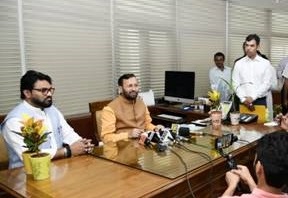In early 2020, no one would have expected an unprecedented pandemic this year that would cause significant disruptions to the industry. The crisis has ushered in a series of radical and sudden changes that have exerted tremendous pressure on companies around the world. This led to many leading-edge technologies and solutions being adopted overnight. In the wake of digital transformation, artificial intelligence (AI) is viewed as a major technological impact that can play an important role in changing the future of work.
Artificial Intelligence enables organizations to make informed, data-driven decisions and forecast the potential outcome of those decisions.
In India, interest in AI has been prioritized by the government and key institutions. The Ministry of Electronics and Information Technologies (MEITY) is actively working on a proposal to implement a national mission for artificial intelligence to increase the use of AI in India. The project is valued at Rs. 2000 crores.
Turbocharge transformation
The experience during the lockdown seemed difficult, but advanced existing digital transformation projects. IT had to rise rapidly to meet the changing business requirements; evolving customer expectations enable everyone to cope up with the crisis. (See: Tech majors extend work-from-home to keep pandemic at bay)
Enterprises that have been slow to embrace digital technologies are realizing the need to fast-track digital transformation initiatives as a result of the increasing uncertainty and closures caused by the pandemic. (See: AI is a must now to speed up digital transformation)
While many organizations have been analyzing AI capabilities and validating concepts for some years, it quickly became a hot topic in boardrooms because of the rise of the remote work environment and the growing amount of ambiguous data.
In 2021, organizations will rely heavily on AI for better resilience, rapid management of IT operations, decision making, maximization of resources, and improvements in supply chain efficiency. Better World expects at least 70 percent of enterprises across all sectors to adopt some form of AI-based technologies and initiate aggressive AI-based production deployments in the next twelve months to establish a competitive edge.
AI will be fundamental to the development of the client experience. In a fast-growing virtual environment, technology leaders would require intelligent models to manage and use the huge amount of data wisely. AI led solutions have the potential to derive concrete insights and help enterprises break down the data intelligently with a tremendous speed (See: AI-driven analytics is CIOs’ mantra in the new normal).
Evolving operating models
The year 2021 will be marked by important business model changes that can help deliver a continuous and exceptional customer experience in a secure and transparent manner.
Businesses in the retail and banking sectors will rapidly launch AI-based conversational chatbots, virtual assistants, fraud detection and face recognition tools to generate a personalized customer experience, strengthen security, compliance and improve their customers’ life-cycle value (See: How artificial intelligence is transforming Indian retail sector and AI in banking now geared for a takeoff)
Similarly, for the health sector, AI is expected to act as a smart intermediary between patients and doctors. The AI-based cloud analytics and fitness monitors will be dynamically deployed to maintain a regular review of a patient’s history and biometric information. This can help experienced physicians monitor their patients remotely even in the most remote regions. For example, a startup called Feebris has been using an AI-powered remote monitoring tool to enable community healthcare workers in India to diagnose respiratory conditions for 10,000 children.
Companies engaged in the manufacturing sector will invest in automated processes and AI algorithms to monitor and inspect production quality and quality assurance activities. German multinational Bosh, for instance, has been extensively testing deep learning techniques to identify production defects through images of the manufactured products in its industrial units in India.
Many global enterprises are expected to use AI to disrupt their work ecosystems. Back office employees will be replaced with a robotic process automation technology based on artificial intelligence to perform repetitive and time-consuming tasks such as document retrieval, invoice processing, operational audits, and application management. For workers in physical offices, AI will be harnessed to develop biometric and facial recognition tools to enable a safe and pandemic-free environment.
Another area where the AI data models will be widely used is cybersecurity. According to a recent report by Wipro, titled state of cybersecurity (SOCR), there has been a massive increase in R&D on AI in the field of cybersecurity, with approximately 49% of the world’s cybersecurity patents filed over the past four years focused on AI and machine learning. It is interesting to note that cybersecurity threats are coming forth on such a massive scale that 87% of the organizations surveyed were eager to implement a zero-trust architecture, an integrated AI and ML-driven security approach for users, applications, data, and networks, in the post-Covid era.
Better support and research for successful AI models
AI’s success also suffers from numerous determinants. Inefficient data, poor data quality, lack of trust, and inadequate support tools make it difficult for many organizations to step up efforts.
Over the next 12 to 18 months, there will be further inroads into AI-enabled smart tools to make them more responsive to varying business needs. Businesses are also expected to invest in these technologies and develop research and development wings to better analyze metrics and improve data response time.
The focus of the enterprises will also be on updating the AI toolkits to look at the behaviors of their users and employees to develop a strong retention strategy.







0 Comments